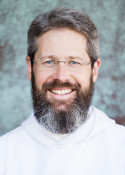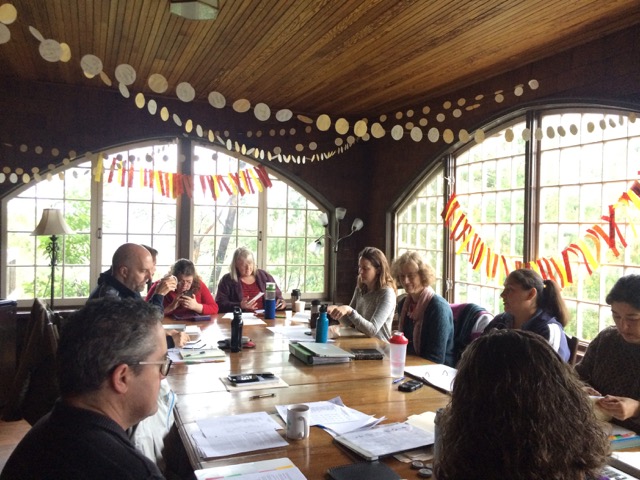FROM THE RECTOR
Measure to Measure
This past Sunday was our annual Vestry Retreat. From Friday evening through early Sunday afternoon at St. Dorothy’s Rest, we focused our attention on the theme of “Sustaining the Vision.” We spent time in reflection on where God is moving in the ministries of All Souls, checked in our on Strategic Plan (more about that in the weeks to come), and spent time in scriptural reflection and true conversation.
As part of our annual organizational meeting and our February Vestry meeting, we elected our new officers: Tara McCulloch as Senior Warden, Maggie Cooke as Junior Warden, Jamie Nelson as Clerk, Marilyn Flood as Treasurer, and Erin Horne, Bob Holum, and Katherine Lisa as Chaplains. In all, it was restorative, inspiring, and at times, hilarious.
Meanwhile, back at the ranch, life at All Souls was in full swing. The Revs. Paula Nesbitt, Joseph Delgado, and Daniel Prechtel preached, presided and guided the faithful, thanks be to God and to them. From what I have heard, you all made church, and made it well.
And for the first Sunday in over eight months, the people of All Souls Parish were led to sing by people not named Carol Terry or Joe Rosenmayer. Joe and Carol did indeed worship and sing at the 9:00 am service, AND they got to go home afterwards! This was made possible for two reasons.
First, as you may have heard at our Annual Meeting, we have called a new Associate for Music, Jamie Apgar. Jamie has served as an organist and accompanist at Presbyterian, Roman Catholic, and Episcopal churches over the past 10 years, most recently at St. John’s Presbyterian in Berkeley. He has also sung in ensembles and choirs for over a decade in Episcopal churches on the East Coast as well as the Washington National Cathedral and the Cathedral of Christ the Light in Oakland. He is an accomplished musician, choral leader, and composer who has facility and passion for the varied ways that we make music.
Jamie comes to us highly recommended, by both those he has worked with and those he has worked for. At present, he is finishing a doctorate at Cal in the History and Literature of Music, currently writing his dissertation, “Singing ‘By Course’ and Protestant Worship in England, c 1560-1640.” I am very excited for him to teach and guide our musicians and our congregation as we learn new ways of singing together.
His first day here at All Souls will be March 6th, and his first Sunday will be March 12th, the Second Sunday of Lent. But have no fear All Soulsians, for we have been gifted from above, yet again. Carol Terry and Joe Rosenmayer have given their all week after week since May, so we agreed that it was time for them to simply worship (once) on Sundays. Enter the Interim Interims, Tripp Hudgins and Jim Armstrong!
Tripp will be scheduling the music, running rehearsals, and leading the choirs for the next month and Jim will be accompanying us on organ and piano during that time. I am very grateful for their willingness to cover this stretch and for their remarkable skill and abilities. We are in excellent hands (and feet) for this time as we prepare for Jamie to lead among us.
Throughout all this past year of uncertainty and trial for our music program, I have been so grateful for our musicians—vocal and instrumental. Week after week, season after season, they have kept us singing on Sundays. And in it all they have reminded us why, in the words of St. Augustine, “it is in song that we pray twice.”
I, for one, can’t wait to keep singing.
Peace,
Phil+
Lenten Small Groups: Soup and Story
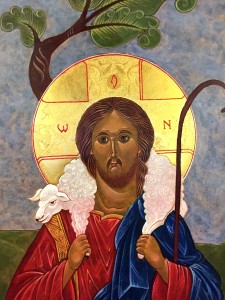 This year, instead of gathering at church on Wednesday nights during Lent, we are going to meet in each others’ homes. Several parishioners have offered to host Soup & Story groups, which will go for five weeks during Lent. Each home group will gather weekly for a soup dinner and then wonder together on a parable.
This year, instead of gathering at church on Wednesday nights during Lent, we are going to meet in each others’ homes. Several parishioners have offered to host Soup & Story groups, which will go for five weeks during Lent. Each home group will gather weekly for a soup dinner and then wonder together on a parable.
Vestry Retreat 2017
How do we sustain the vision of a vibrant All Souls?
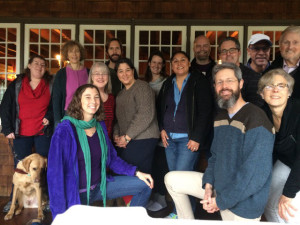 This was the focus of the annual All Souls vestry retreat held last weekend at beautiful St. Dorothy’s Rest in the redwoods near Occidental. We began the weekend with scripture reflection and prayer, followed by considering the model developed by the College for Congregational Development to describe the essential activities of church: Gather, Transform, Send. Gather includes invitation, welcome and incorporation, Transformation happens in worship and prayer, study and learning, community life, and action, while we are Sent from church to our families, workplaces, communities and the wider church. On Friday night this model was cleverly presented in the form of a game of Jeopardy (We’ll take Transformation for 400 points…”)
This was the focus of the annual All Souls vestry retreat held last weekend at beautiful St. Dorothy’s Rest in the redwoods near Occidental. We began the weekend with scripture reflection and prayer, followed by considering the model developed by the College for Congregational Development to describe the essential activities of church: Gather, Transform, Send. Gather includes invitation, welcome and incorporation, Transformation happens in worship and prayer, study and learning, community life, and action, while we are Sent from church to our families, workplaces, communities and the wider church. On Friday night this model was cleverly presented in the form of a game of Jeopardy (We’ll take Transformation for 400 points…”)
The vestry assessed the strength of our activities in each of these areas and overlaid activities associated with our strategic initiatives adopted three years ago (Christian Practice and Daily Action, Parish House project, and Deep Hospitality) to reveal where our strengths are and what areas may need more attention.
On Sunday morning we interwove our vestry meeting with the liturgy and Eucharist, celebrated under the “cloud of witnesses” — small golden discs with the name of every parishioner, strung together into banners by the Rev. Liz Tichenor.
Lest this sound like too much work, there was a rollicking game of Salad Bowl lasting into the late hours Saturday night. Don’t know what Salad Bowl is? Ask a vestry member; listed below with their vestry-ministry liaison role.
Formation: Rebecca Whitney
Justice and Peace: Ivor Emmanuel
Small Groups: Bo Burlingham
Worship: Bob Holum
Community Building: Kat Lisa
Communications: Nancy Pryer
Evangelism and Newcomers: Erin Horne
Pastoral Care: Matt McGinley
Finance and Stewardship: Mark Koops-Elson
Property: Mary Rees
– Nancy Pryer
A DEACON’S REFLECTION ON STANDING ROCK
The reflection below is by the Rev. Ken Powell, a former member of All Souls who is now a deacon at Grace Memorial Episcopal Church in Portland, Oregon. In early November, Ken traveled to the Standing Rock reservation to join Bishop Marc and other clergy and laity from around the country in a show of support for the tribe’s opposition to the Dakota Access pipeline. He wrote this reflection upon his return.
With the inauguration of President Trump on January 20, the Standing Rock Sioux Tribe’s opposition to the proposed Dakota Access pipeline has once again been brought to the attention of the nation. In December of last year, after months of protests at Standing Rock by native peoples and supporters, the Army Corps of Engineers, which must grant a permit for the pipeline to cross the Missouri River, indicated that it would engage in a further environmental study to explore locations for the pipeline crossing that would not run close to the reservation’s boundaries and endanger water supplies. On January 24, 2017, however, the new President issued a directive to the Secretary of the Army to expedite review of the original application for the pipeline crossing at Lake Oahe. On February 7, 2017, the Secretary of the Army announced that the Army Corps will issue the necessary permit for the Lake Oahe crossing. Further legal action by the tribe to oppose the granting of the permit is likely. The Justice and Peace Ministry continues to offer support to the tribe and we ask the congregation to remain in prayer for the people of Standing Rock, with whom we have had such a longstanding relationship.
– Lewis Maldonado, Justice and Peace Committee
Standing with the People of Standing Rock – A Personal Reflection
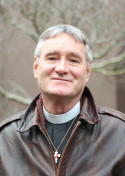 Dear friends in Christ,
Dear friends in Christ,
As most of you know a call for clergy to support the community of Standing Rock Indian Reservation in North Dakota by Rev. John Floberg for the purpose of resisting the construction of the Dakota Access Pipeline received an enormous response from well over five hundred faith leaders of virtually every spiritual tradition. Many of the facts and disputes regarding the project are circulating in the media for your own discernment but I would like to share with you a few personal reflections of my experience there which depart from the standard narrative.
As a deacon called to stand with the vulnerable, to work for justice and to interpret to the church “the needs, hopes and concerns of the world” the rationale for making the long journey from Portland, Oregon was self-evident. But given the immense challenges we are facing at every turn I wondered what it was about this situation that was so compelling? I soon realized that land and water anciently understood and experienced as a sacred gift of the Creator is such a rare and precious gift in our time and place that I could not imagine being silent and remote while it was threatened with desecration if it was at all in my power to be vocal and present. In that spirit, I made plans to attend the November 3rd gathering, knowing that many like-minded souls were also to be my companions and prayer partners.
Almost immediately the journey became a pilgrimage, and had the fullness of a sacramental immersion. I was aware of a deep need for a ritual of repentance and a gratitude to the native people for preserving a living memory of a spirituality that cherished the earth and all its creatures. I was struck again and again by the terrible dilemma of traveling roughly the same distance by automobile from my home as the proposed oil pipeline from the Bakken Oil Fields to Standing Rock along roadways that followed the Columbia, Yellowstone and Missouri Rivers— already crosshatched with pipelines and powerlines and dams. Was it hypocrisy to proceed in this way, an unavoidable entanglement, or maybe simply time to say to myself and to the world this is too much, the last straw for me? We have to find a better way!
It needs to be told that the people of Standing Rock were spectacularly hospitable, generous in spirit, gravely committed and deeply moved by the clergy’s honoring of their dignity and right to self-determination, just as we were moved by their many tokens of acceptance and forgiveness.
The guiding principles of our participation were simple but profound. We were guests of the governing Council and as such were required to act “prayerfully, peacefully, non-violently, and legally.” Our purpose was to “bear witness” to the truth of the circumstances and the residents right to protest in light of the invasive presence of overwhelming corporate power and an intimidating police posture. The tension was palpable on all sides. Our hope to be a calming voice was achieved, I believe, during our relatively short time at the site. Others— we hope— will continue to carry the banner of peaceful resistance.
It also needs to be told that among the mass of “protectors” —as they refer to themselves— there are those who believe that more aggressive and perhaps provocative methods may be necessary. In their readiness to expose themselves and others to a high risk of injury and potential property damage their values do not align with those of the residents to the best of my knowledge. Our hosts emphasized, on the contrary, that they must remain behind when all is said and done and they were unequivocal in their desire to keep the peace as best they might.
In closing I would like to highlight what I took to be the deepest and potentially most meaningful feature of the encounter between the leaders of the gathered tribes and the hundreds of Christian faith leaders who spoke on behalf of their own communities of faith from both the personal and the national level.
In the simplest of terms this was enacted ritually by members of the universal Church of Christ repudiating the 15th century papal bull known as the “Doctrine of Discovery” which provided the “religious” justification for claiming any land in the “new world” not already claimed by a “Christian monarch”.
If anyone needs assurance that this doctrine is still relevant just travel anywhere along the course of the Missouri or Columbia rivers to the Pacific Ocean and you will see signs extolling the “Corps of Discovery”— otherwise known as the Lewis and Clark— expedition into the lands purchased at a pittance from France, who claimed it for themselves simply because they could.
By witnessing and burning a copy of that document as a sign of repudiation— for the first time ever in the presence of tribal elders— in a sacred fire maintained by those elders on their sacred land while encircled in solidarity by those who knew the doctrine to be a part of the cross which they had been carrying, the flames to be the presence of the Holy Spirit and the ascending smoke a prayer of repentance for harm done in Christ’s name… we have hope of Christ’s forgiveness and reconciliation with our native sisters and brothers.
– Deacon Ken Powell
Grace Memorial Episcopal Church, Portland, Diocese of Oregon
PLEASE TELL US ABOUT YOU AND ALL SOULS!
Madeline Feeley wrote a couple of weeks ago about the Appreciative Inquiry process going on right now at All Souls. Appreciative Inquiry is simply a structured process for hearing from you about our life together at All Souls. As we gather for conversation in small groups, we discuss responses to four simple questions (that’s the inquiry part) that help us focus on what’s going well (that’s the appreciative part). It’s important for as many of us to participate as possible—so please don’t miss out. We want you to add your stories and your voice to the chorus because the threads and themes that emerge will guide our clergy and vestry in their leadership. And, as the people who’ve already participated in the groups can tell you, it’s wonderful to hear other All Soulsians share their experiences and their appreciation for our parish.
You can sign up for groups here. There are slots on February 19 and 26 following the 11:15 a.m. service. Childcare is available on the 19th. Don’t delay—sign up today!
NEW ADULT FORMATION CLASS
Creeds…What are they good for? with Scott MacDougall (Parish Hall)
Beginning this Sunday, February 12
A lot, in fact. Have you wondered why we have creeds at all? Why we pray with them? Aren’t those heresies over anyway? Seriously, what good could come of these ancient statements? Prof. Scott McDougall, All Soulsian and systematic theologian, is ready for any and all questions, thoughts, concerns and rants you may have. Fair warning: you may leave this class with a deeper appreciation and fondness of these statements of trust than you ever imagined.
MIDDLE SCHOOL LOCK-IN
The Catechumenate
Exploring Our Tradition
Do you come to All Souls from somewhere other than the Episcopal tradition? Do you have questions about the traditions of the Episcopal church, its history, theology, and the Book of Common Prayer and its uses? Would you like to be baptized or become an Episcopalian (or least learn more)?
If so, the Catechumenate might be just what you are after. Starting March 5th and going through April 9th on Sunday evenings in the Common Room, Stephan Quarles and Emily Hansen Curran will walk us through these great questions of our tradition. This six-week course can also be used as a refresher for those of you already confirmed Episcopalian!
Please contact Emily for more information.
Help make a grant to a health and wellness project in the community
Join the Episcopal Impact Fund and fellow church and community members at this year’s Alameda Action Network meetings! Grant funding is available to local nonprofit service organizations that are creating pathways out of poverty; this year’s focus area is health and wellness. You can participate by attending a meeting and bringing your ideas of projects that are making a difference. Last year, Attitudinal Healing Connection was chosen as an Episcopal Impact Fund grant recipient with the help of the Alameda Action Network. To learn more, visit episcopalimpact.org.
When: Tuesday, February 28, 7:00 – 8:30 pm
Where: Episcopal Church of Our Saviour, 1011 Harrison Street, Oakland
What do you do with idle hands?
We are gauging (ha!) interest in revitalizing the Idle Hands group of needlework creators. In the past, All Soulsians who were interested in knitting, crocheting, sewing and other needlework got together regularly on a weeknight at a local pub (and occasionally homes) to work on projects, share ideas, enjoy conversation, and be in community. It was even a time to teach and learn new techniques and skills. The company was grand and great times were had, but the group has been on hiatus for many months. We are wondering if there is enough energy to reconvene regularly again, and gauging interest in whether the preferred focus would be on something like a Prayer Shawl or other charitable ministry (making items for those in need), working on personal projects, or both.
A few questions:
What sort of handwork do you do or want to learn – knit, crochet, needlepoint, sewing, or other?
Meet-ups usually take place on a weekday evening; how often would you realistically like to meet?
– Twice a month
– Once a month
– Work on projects on my own time, to donate
Rank in order of your personal priority:
– Sabbath: To set aside time to create, work on projects, make beauty and relax
– Affinity: To spend time in community with other handworkers and All Soulsians, good conversation and fellowship
– Ministry: To share my skills with those in need, creating gifts as a ministry to others
Please respond to Ari Wolfe or Jeannie Koops-Elson.




